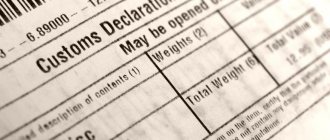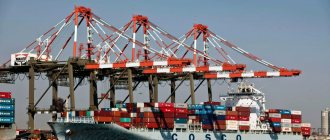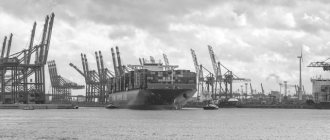Types and procedure of customs escort
Convoy (customs escort) applies to the transportation of goods and documents.
Customs escorts vehicles on which goods are transported. The carrier may request a convoy if he does not provide security for the fulfillment of the tax obligation to pay import customs duties and taxes (if required). During customs escort, customs officers ensure that the carrier carries out the customs transit procedure, monitor the execution of customs procedures, and check identification means when vehicles transporting goods stop.
Who are our services for?
The import support service is primarily of interest to large brand companies that are faced with the need to import goods, but for one reason or another do not want to create their own import department. For example, when goods are imported relatively rarely.
Let’s assume that there is a supplier of goods, a contract has been concluded with him, but in order for the cargo to cross the customs border and be delivered to the client, you need to agree with the supplier, receive accompanying documents from him, carry out certification or declaration, decide what transport and route the cargo will be transported, what transport company, at which customs post it will be cleared through customs. Accordingly, at each stage it is necessary not only to negotiate and make decisions, but also to legally formalize the transaction - to prepare certain documents.
ATTENTION! We work only with legal entities.
To quickly complete these tasks, several specialists are required, each of whom will provide their part of the work. It is not profitable for all companies to maintain an import department, because they need to pay wages, pay sick leave and vacations, regardless of the number of deliveries. In addition, we need qualified employees who have practical experience. By outsourcing import support, the customer not only saves, but also entrusts the organization of delivery to professionals.
Who pays for customs escort
The carrier pays customs fees for customs escort of goods. Once customs decides that a customs escort is necessary, the carrier is required to pay customs duties. In this case, it is imperative that the carrier pays for everything before the actual start. Appendix 3 of the Decree of the President of the Republic of Belarus dated July 13, 2006 No. 443 “On customs duties” stipulates how much to pay for customs escort established by the Appendix. The rate of fees for customs escort varies depending on who owns the transport for customs escort (carrier or customs) and when the transit takes place. If transport is provided by customs, the rate for each hour of customs escort is 20 euros. If transport is provided by a carrier, the customs escort rate is 5 euros. It doesn't matter whether a full or partial hour is meant. The procedure for customs escort is regulated by Resolution of the Council of Ministers of the Republic of Belarus dated June 13, 2007 No. 788 “On approval of the Regulations on the procedure for carrying out customs escort.”
Features of the import support service
You can choose a manufacturer in any country, and we will organize delivery, while solving related problems that can become a stumbling block for an unprepared importer. The only caveat is that you must find a supplier and conclude a contract with him yourself. Only after this will the SB Cargo manager get involved in the work. We need primary documents, in particular the contract. We need to know which supplier we will work with and what product we need to buy. SB Cargo can undertake the entire remaining amount of work.
Speaking on behalf of the customer company and on his behalf, the manager of the import support department:
- will contact the supplier and send him the necessary instructions;
- prepares documents (for example, letters of approval for trademarks);
- will check shipping documents from the supplier: invoice, packing list, specification, certificate of origin (if any);
- coordinates the shipment process;
- organizes certification;
- will ensure the implementation of the necessary processing operations at the transit warehouse or customs warehouse, including KIZ, DataMatrix or other markings;
- organizes transportation by any type of transport through the logistics department;
- calculate delivery costs;
- will appoint a customs representative who will declare the cargo, handle customs clearance and represent the interests of the customer directly at customs;
- will resolve legal issues if an adjustment of customs value is assigned.
In fact, the import support manager coordinates the work of all departments: logistics, legal, customs clearance, mutual settlements.
Accompaniment procedure
The relevant Instruction, approved by the joint resolution of the Ministry of Internal Affairs of the Republic of Belarus and the State Customs Committee of the Republic of Belarus dated August 2, 2006 No. 208/61, stipulates the procedure for accompanying goods under customs control and transported by road. The customs escort procedure is carried out by the Security Department of the Ministry of Internal Affairs of the Republic of Belarus. In the Resolution of the Council of Ministers of July 4, 2006 No. 829 “On the establishment of tariffs for services for accompanying (mandatory escort) of goods and vehicles, including those under customs control, transported across the territory of the Republic of Belarus by road and rail (with the exception of services for customs escort)" stipulates tariffs for services for customs escort of goods and vehicles transported across the territory of the Republic of Belarus by road and rail (with the exception of customs escort services).
How it all happens
First, delivery details are discussed with the supplier. This work is carried out by a specially designated department. Managers, representing the interests of the customer and acting on his behalf, conduct business correspondence with suppliers abroad. Correspondence can be conducted in English or another language. They help resolve organizational issues and ensure shipment within a predetermined time frame.
For example, when negotiating with a supplier on the terms of EXW shipment (when the forwarder makes an export declaration after loading and sends documents to the supplier), the manager clarifies the conditions for sending the goods: the cargo is sent according to one customs declaration or several, and agrees on the shipment date for timely preparation for customs procedures.
Managers check and correct shipping documents (invoice, invoice, packing list, etc.) in cooperation with the supplier and point out errors. They send draft shipping documents to the supplier, first adjusting them so that they are drawn up in accordance with all the rules. Certain typos or inconsistencies in information are not so rarely made by the supplier, and this significantly affects the speed of customs clearance and the success of the procedure as a whole. The supplier may well make a mistake in the product codes (they do not correspond to the characteristics of the cargo) or provide other inaccurate information.
The manager's work specifically includes:
- detection of discrepancies in weight (gross/net) and quantity of goods, names in the invoice, packing list or other documents;
- request and clarification of necessary information for logistics, for example, dimensions and height of pallets, number of boxes, warehouse address, loading date, contacts of the responsible person;
- clarification of the method of packaging the goods and the specifics of transportation, loading/unloading;
- obtaining a trademark certificate and certification permit;
- organizing product certification (discussion with the supplier about the possibility of pre-sending samples for certification);
- checking product labeling, correcting it in accordance with the regulations, and, if necessary, organizing KIZ labeling;
- initiating the procedure for opening a letter of credit at the bank and approving the relevant documentation.
When all agreements are reached and the goods are shipped by the supplier, other departments are involved in the work. The certification department helps to certify product samples and obtain the necessary permits. The logistics department deals directly with transportation. Then SB Cargo customs representatives perform customs clearance of the goods. Thus, we provide a full range of services, starting from the purchase of goods and ending with their delivery to the client.
Procedure for collecting duties for customs escort
Joint Resolution of the Ministry of Internal Affairs, the Ministry of Finance and the Ministry of Economy dated January 9, 2008 No. 6/1/8 stipulates the procedure for collecting fees for the services of the units of the Security Department of the Ministry of Internal Affairs of the Republic of Belarus for the mandatory escort of goods and vehicles, including those under customs control, transported across the territory of the Republic of Belarus by road transport. The fixed amount of customs duties and taxes in relation to certain types of goods (this is mainly alcoholic products) is given in the appendix to the Resolution of the Council of Ministers of the Republic of Belarus dated August 1, 2007 No. 977 “On some issues of ensuring the fulfillment of the tax obligation to pay customs duties and taxes.”
Segregation of duties
We emphasize that some of the preliminary work is performed first by the client.
Your tasks:
- Select a supplier and product.
- Determine the terms of delivery and payment.
- Conclude a foreign trade contract.
- Select products.
- Pass the information to the SB Cargo representative.
Our tasks:
- Delivery cost calculation.
- Preparation of payment schedule.
- Choosing a logistics scheme, route, transport company - concluding contracts with carriers on your behalf.
- Coordination of goods shipment.
- Receipt and verification of accompanying documentation.
- Organization of transportation.
- Product certification.
- Customs clearance.
- Assistance with processing foreign exchange transactions.
The manager is assigned to each delivery and acts as an intermediary between the supplier and the customer. At the same time, employees of the brand company receive all the necessary information at all stages and thus can control the progress of the delivery.
Forms and types
Customs escort can be used for various types of transport, including:
- Automotive.
- Railway.
- Air.
- River or sea.
In form, this can be an outfit on your own transport or on the transport of the carrier. In this case, for motor vehicles the order is as follows:
- One outfit for no more than 10 units of transport.
- When following a column, accompanying persons must be at its beginning and end.
- Control does not stop even when stopping.
- If the vehicle malfunctions, the entire convoy waits for the arrival of an additional escort squad.
For sea transport:
- One squad controls one vessel.
- It can be placed in the ship's premises, but during parking, all cargo must be in its vision area.
- All loading and unloading after permission from the senior squad.
Air transport support:
- On one plane - one outfit.
- During the flight - attire in the cabin, at airports - near the plane.
In this case, the general requirements for the possibility of using such a regime are as follows:
- Possibilities for cargo identification.
- Compliance of the vehicle carrying the cargo with the requirements for transit movement, that is, the possibility of its sealing.
- Compliance with the rules prescribed in such cases.
Concept and essence
This customs procedure is used to escort vehicles transporting goods through customs transit, and it involves employees of customs structures or other organizations, if so provided by law.
The essence of this support is as follows:
- Valid on the territory of the Russian Federation.
- With this procedure, security for payment of duties and customs taxes is not required.
- Losses from such a procedure are at the expense of the cargo owner.
Problems of conducting
During customs transit, the following violations most often occur:
- Illegal unloading of transport on the territory of the Russian Federation with non-payment of customs taxes.
- Replacement of expensive branded goods with cheaper counterfeits of low quality.
And the customs service combats such violations by applying customs escort rules. This is an effective tool, but certain problems arise when implementing it:
- Falsification of documents for imported cargo and transit transport during registration of escort.
- Providing false declarations. This is manifested due to the lack of ability to quickly check the product using instrumental methods.
- Inconsistency of regulatory rules in the application of customs regulations.
- Inconsistency of policy in the application of sanitary measures when accompanying goods.
This video will tell you about customs escort:










